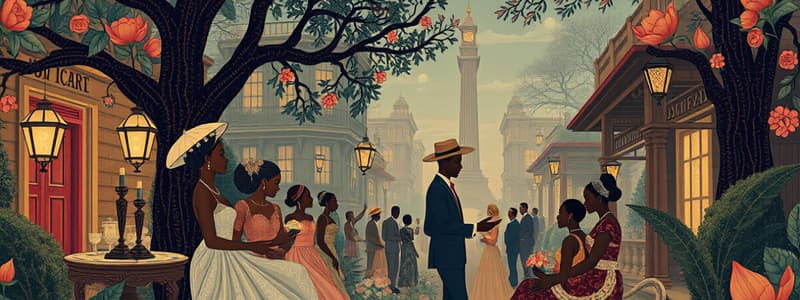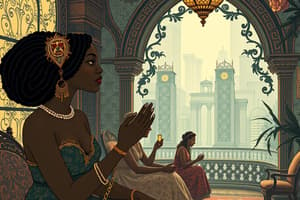Podcast
Questions and Answers
What was the Harlem Renaissance also known as?
What was the Harlem Renaissance also known as?
- The New Black Movement
- The Black Cultural Revolution
- The New Negro Movement (correct)
- The African American Enlightenment
Who coined the term 'New Negro'?
Who coined the term 'New Negro'?
- Zora Neale Hurston
- Claude McKay
- Alain Leroy Locke (correct)
- W.E.B. Du Bois
What was a significant impact of Harlem Renaissance art?
What was a significant impact of Harlem Renaissance art?
- It glorified African heritage and sought to create a new perception of black culture. (correct)
- It created a new visual art style distinct from European influences.
- It focused solely on jazz music.
- It primarily depicted scenes of poverty and despair.
Which artist is known for the sculpture 'Ethiopia Awakening'?
Which artist is known for the sculpture 'Ethiopia Awakening'?
What role did W.E.B. Du Bois play in the Harlem Renaissance?
What role did W.E.B. Du Bois play in the Harlem Renaissance?
Which musical genre became a symbol of the Harlem Renaissance?
Which musical genre became a symbol of the Harlem Renaissance?
What was the primary focus of the NAACP during the Harlem Renaissance?
What was the primary focus of the NAACP during the Harlem Renaissance?
Which of the following artists is known for capturing everyday life in Harlem through photography?
Which of the following artists is known for capturing everyday life in Harlem through photography?
Which of the following themes was NOT commonly expressed in Harlem Renaissance art?
Which of the following themes was NOT commonly expressed in Harlem Renaissance art?
Why did some middle-class African Americans initially resist jazz music?
Why did some middle-class African Americans initially resist jazz music?
What type of artistic styles were commonly used during the Harlem Renaissance?
What type of artistic styles were commonly used during the Harlem Renaissance?
Which literary work is associated with Zora Neale Hurston?
Which literary work is associated with Zora Neale Hurston?
How did Aaron Douglas contribute to the Harlem Renaissance?
How did Aaron Douglas contribute to the Harlem Renaissance?
What was a notable characteristic of the Harlem Renaissance's artistic expression?
What was a notable characteristic of the Harlem Renaissance's artistic expression?
What was a primary motivation for the Great Migration of African Americans to northern cities in the 1910s?
What was a primary motivation for the Great Migration of African Americans to northern cities in the 1910s?
Which event contributed to increased racial violence in the United States after World War I?
Which event contributed to increased racial violence in the United States after World War I?
What was the primary role of Claude McKay in the Harlem Renaissance?
What was the primary role of Claude McKay in the Harlem Renaissance?
Flashcards are hidden until you start studying
Study Notes
Harlem Renaissance Overview
- Originated in the 1920s in Harlem, New York, as a cultural, artistic, and intellectual movement among African Americans.
- Key factor: The Great Migration, with millions moving north to escape Southern racism and pursue job opportunities in war industries.
Causes of the Harlem Renaissance
- African Americans faced severe racism in the South, including violence, lynching, and oppressive Jim Crow laws.
- Post-World War I, many black veterans returned to heightened racial violence, leading to significant unrest.
- Claude McKay’s poem “If We Must Die” captured the struggles for equality and respect during this tumultuous period.
The New Negro Movement
- Alain Leroy Locke, a pivotal figure, coining the term "New Negro Movement."
- Locke's book "The New Negro: An Interpretation" laid the intellectual foundation, advocating for equal civil rights and changing perceptions of African Americans.
Lasting Impact of the Harlem Renaissance
- The movement inspired and influenced future civil rights movements, reflecting themes of African heritage and cultural appreciation.
- Notable artistic contributions included Aaron Douglas's work celebrating African heritage and Louis Armstrong's jazz innovations.
Contributions of Women Artists
- Female artists' contributions, historically overlooked, gained recognition over time.
- Zora Neale Hurston’s novel "Their Eyes Were Watching God" played a crucial role in embodying the spirit of the Harlem Renaissance.
- Bessie Smith, known as “The Empress of Blues,” made significant contributions to the music of the era.
Civic Engagement and Organizations
- The National Association for the Advancement of Colored People (NAACP) emerged, focusing on civil rights advocacy, still active today.
- W.E.B. Du Bois, a founding member, provided a platform for black artists and intellectuals through NAACP publications.
Themes in Harlem Renaissance Art
- Artwork often highlighted African heritage, folk traditions, and social issues like racism and discrimination.
- Artists expressed pride in black identity and depicted daily life through vibrant, expressionist styles.
Notable Artists and Their Work
- Meta Vaux Warrick Fuller: Known for "Ethiopia Awakening," symbolizing rebirth and connecting African culture with Egyptian imagery.
- James Van Der Zee: Celebrated for his portraits of black New Yorkers, capturing everyday life and culture.
- Augusta Savage: Created realistic sculptures, including "Gamin," reflecting the experiences of African Americans.
Jazz and its Cultural Significance
- Jazz became a defining musical genre of the 1920s, rejecting conventional styles and rooted in African American culture.
- Initially resisted by the middle-class black community, jazz gained respect as it incorporated more sophisticated elements like the piano.
- Louis Armstrong and Duke Ellington, key figures in jazz, performed at the Cotton Club, highlighting the racial disparities of the era.
Literary Contributions
- Langston Hughes combined jazz rhythms with poetry, significantly influencing the Harlem Renaissance's cultural landscape.
- The movement encouraged cross-disciplinary collaborations among music, poetry, and visual arts, fostering a rich cultural dialogue.
Studying That Suits You
Use AI to generate personalized quizzes and flashcards to suit your learning preferences.




